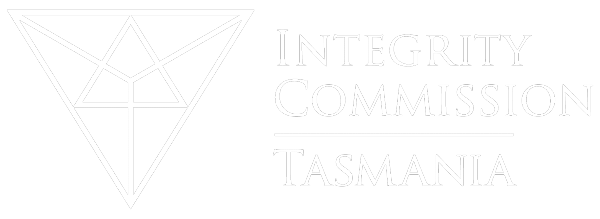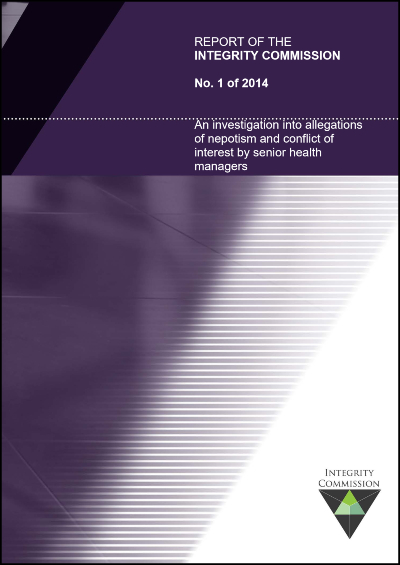Executive summary
This is a summary of a report of an investigation undertaken by the Integrity Commission arising from a complaint made to it in March 2013. The full investigator’s report, which is over 150 pages and contains details of the extensive evidence gathered by the Commission in nearly one year of investigation, has been referred to appropriate authorities for action (see ‘Outcomes of the Investigation’).
The complaint alleged that two senior officers of North West Area Health Service (NWAHS) – Mr Gavin Austin and, before him, Ms Jane Holden – had used their positions to unfairly provide employment for family members (Ms Holden’s husband and Mr Austin’s son) in building work on ‘health department’ properties on King Island.
As the allegations were investigated, evidence was gathered that gave rise to more allegations of similar conduct by the two officers. Those allegations related to conduct from 2009 to late in 2013, and involved not only the NWAHS (as it was), but Tasmanian Health Organisation North West (THO-NW) (as it became), as well as Tasmanian Health Organisation South (THO-S) and the Department of Health and Human Services (DHHS).
During the period in question, Ms Holden was the CEO of the NWAHS while Mr Austin was firstly the Finance Director then acting CEO. Ms Holden became the CEO of Southern Tasmania Area Health Service and later (and remains) the acting CEO of THO-S; Mr Austin is now the CEO of THO-NW.
Ms Holden and Mr Austin had both been recruited to DHHS from New Zealand and had previously worked together at the Northland District Health Board (NDHB) in Whangerei.
The Commission’s investigation has identified conduct by both officers in relation to the procurement of services from, and the employment of, direct family members and others with whom they had shared a professional (and additionally, in the case of Mr Austin, a financial) association in New Zealand.
Those procurements and recruitments have brought financial benefits to the persons associated with Ms Holden and Mr Austin.
It is the view of the Integrity Commission that the conduct of both officers involved conflicts of interest which were not dealt with in accordance with applicable policy or legislative requirements.
The investigation revealed that the two officers failed to comply with procurement and employment policies and procedures, including relevant Treasurer’s Instructions, Employment Directions, Ministerial Directions and the requirements of legislation (including the State Service Act 2000). In every instance identified in the report, a family member or associate of the officers was a beneficiary of the non-compliant conduct.
The investigation also revealed conduct by other staff of NWAHS, THO-NW and THO-S in breach of relevant policies and procedures (some of which benefited Ms Holden and Mr Austin’s family members or associates). While it cannot be proven that such breaches were influenced by perceived or actual pressure from Ms Holden or Mr Austin, it must be the case that the culture of an organisation is significantly influenced by its senior managers and 2 leaders. If they do not ‘follow the rules’ then others will, inevitably, consider that it is appropriate to behave in the same way. As the report notes, it is telling that it took a member of the public to complain to the Commission, rather than any staff members who, if the ethical culture had been healthy, could have been expected to have ‘raised the alarm’.
The financial cost of the non-compliance with applicable policies, guidelines and legislative requirements, identified during the investigation, is estimated to exceed $500,0001 – not including the salaries paid to the officers’ family members as employees. There are other, unquantifiable costs, including the effect of the conduct on the ethical culture of the agencies which the officers led, poor quality work (including lack of value for money), and lost opportunities for Tasmanians.
The investigation revealed manifestly inadequate record keeping, particularly in relation to recruitment at DHHS, NWAHS and THO-NW. In relation to the latter, there was also poor record keeping in relation to procurement, and significantly poor practices and non- compliance with Treasurer’s Instructions and a consequent failure (or non-existence) of mechanisms to detect the non-compliance.
There is evidence that, in the North West, a practice has developed of entering into unofficial or ‘local’ arrangements to boost the remuneration of employees. Such arrangements are contrary to applicable State Service policies.
A consistent theme in the responses of Ms Holden and Mr Austin to the investigation and its findings was that they relied on their staff to ensure compliance with relevant policies and, in Mr Austin’s case, that he did not know about applicable policies. However, it is self-evident that ‘the buck stops’ with the person occupying the position of Head of Agency (or CEO in the case of the then Area Health Services) and it is simply not an acceptable excuse to assert that more junior officers should have ensured that the senior officers exercised their responsibilities properly.
On two occasions, when the media made legitimate and accurate inquiries about some of the matters detailed in this report, the responses by the agencies concerned can be characterised as ‘spin’. The inquiries were deflected with information that had the effect of being misleading. Both officers gave direct input to these media responses.
It is clear that whatever governance arrangements should have been operational in respect of the actions of the CEOs, they have not worked effectively. Failure in governance is evident ‘across the board’ in all the matters examined in this report.
It is not the normal practice of the Commission to name public officers in its reports to Parliament. However, in this instance it has been decided to name Ms Holden and Mr Austin because it is necessary to give meaning and context to the report and because of their seniority and status – particularly as they came to occupy the positions of Heads of Agency. Other officers have not been named in this report but are identified in the Commission’s investigation report.
Finally, this investigation has shown that the Integrity Commission is uniquely able to uncover misconduct that is missed or overlooked by other available accountability mechanisms (such as internal audit processes).
Related content: Steps and strategies for managing conflicts (PDF, 101.7 KB)

